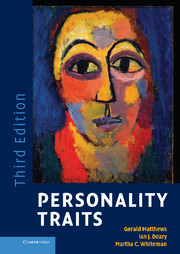Book contents
- Frontmatter
- Contents
- List of figures
- List of tables
- List of boxes
- Preface to the third edition
- Preface to the second edition
- Preface to the first edition
- Part I The nature of personality traits
- 1 The trait concept and personality theory
- 2 Persons, situations and interactionism
- 3 Personality across the life span
- 4 Stable traits and transient states
- 5 Alternative views of personality: challenges to trait theory
- Part II Causes of personality traits
- Part III Consequences and applications
- 14 Conclusions
- References
- Author index
- Subject index
5 - Alternative views of personality: challenges to trait theory
Published online by Cambridge University Press: 05 June 2012
- Frontmatter
- Contents
- List of figures
- List of tables
- List of boxes
- Preface to the third edition
- Preface to the second edition
- Preface to the first edition
- Part I The nature of personality traits
- 1 The trait concept and personality theory
- 2 Persons, situations and interactionism
- 3 Personality across the life span
- 4 Stable traits and transient states
- 5 Alternative views of personality: challenges to trait theory
- Part II Causes of personality traits
- Part III Consequences and applications
- 14 Conclusions
- References
- Author index
- Subject index
Summary
Thus far, we have outlined the general case for approaching the study of personality via the trait concept. Before developing this argument, we must look briefly at the relationship between trait theories and other approaches to personality, such as psychoanalysis and humanistic psychology. There are three main reasons for so doing. First, trait theory has not developed in isolation from alternative theories. Allport (1937), for example, explicitly stated that his trait theory was an attempt to unify the diverse personality theories of his day. It is important to identify both those features of trait theories which are distinctive from other approaches and areas of common ground between trait theories and the alternatives. An issue of particular importance is consistency of behaviour. As we shall see, the idea of temporal stability in behaviour and mental life is not exclusive to trait psychology. Second, our thesis in this book is that trait psychology is becoming the dominant paradigm for personality research. This chapter offers some reasons why the trait approach may be more successful than competing ones, such as its use of the scientific method, and its ability to accommodate empirical data on behavioural consistency and stability. Third, although psychoanalysis and humanistic psychology are minority interests among personality scientists, these disciplines continue to develop and to inform empirical research. New constructs inspired by these fields, such as implicit or unconscious personality traits, may extend the range of traits that should be accommodated within an evidence-based account of personality.
Information
- Type
- Chapter
- Information
- Personality Traits , pp. 121 - 150Publisher: Cambridge University PressPrint publication year: 2009
